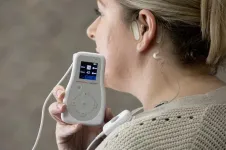(Press-News.org) Medical University of South Carolina neuroscientist Bashar Badran, Ph.D., was one of only 10 investigators nationwide recognized for their research at the fifth annual scientific meeting of the National Institutes of Health – Helping to End Addiction Long-Term (NIH HEAL) Initiative in Bethesda, Maryland. Badran received an honorable mention for the NIH HEAL Initiative Trailblazer Award.
The NIH HEAL Initiative provides funding to encourage scientific research into opioid use and pain management to fast-track progress in the face of the country’s current opioid epidemic. Its Trailblazer Award recognizes HEAL grant-funded researchers who adopt an innovative approach or otherwise show creativity in their research into opioid use or pain management.
“It's an honor to get national recognition for work that we've been engaged in for over 10 years now at MUSC,” said Badran. “And it validates the work not only that I’m doing but that my team is doing.”
Badran is an associate professor in the Department of Psychiatry & and Behavioral Sciences at MUSC and leads the Neuro-X Lab, which leverages neurotechnology to address complex medical and neuropsychiatric disorders.
Badran’s current project focuses on a type of wearable technology that works to alleviate pain by directly stimulating nerves in the ear with electricity. This technology, called transcutaneous auricular neurostimulation (tAN), is a noninvasive, drug-free way of stimulating the body’s vagus and trigeminal nerves.
The vagus nerve plays an important role in pain perception by transmitting signals between the pain centers of our brain and other parts of our body. The flow of these signals can be changed by stimulating this nerve, reducing the amount of pain that people experience.
Badran and his team are currently studying how tAN works to reduce patient pain levels. To do this, they are looking at how blood flow through the brain changes in real-time during tAN using functional magnetic resonance imaging, or fMRI. In doing so, they can see how activity in specific brain regions, such as the pain centers, is being affected by stimulation.
“These studies are the largest concurrent stimulation/ fMRI studies that have ever been done,” said Badran. “And they’re the only ones of their kind that attempt to understand the underlying mechanism of stimulation.”
Badran also suspects that stimulation of the vagus nerve may release endorphins, a type of opioid naturally produced in the brain, into the bloodstream, explaining the pain-relieving effects of tAN. To test this, he is running another study focused on blocking the effects of endorphins to see if tAN can still provide pain relief in their absence.
Badran has been working on noninvasive vagus nerve stimulation, which he initially thought of as a “moonshot,” for over a decade.
“Prior to 2013, the only way to activate the vagus nerve was to do a surgery to implant a nerve stimulator,” said Badran. “So, we ran different parameter, imaging and behavioral trials of a potential alternative approach, all of which suggested that we can deliver stimulation to this nerve noninvasively.”
This research has far-reaching implications: It could lead to a fundamental change in the way we understand and treat pain disorders.
If doctors could prescribe to patients suffering from chronic pain a noninvasive, wearable device, rather than opioids, Badran thinks that it could reduce the number of new opioid users each year.
This revolutionary technology could be an important tool in combating the opioid epidemic gripping our nation by providing a safer, nonaddictive treatment for the 51 million Americans who struggle with chronic pain each year.
Although there is still a long way to go before that happens, Badran is hopeful for the future.
“I wish I could fast-forward to know the answers, but right now we’re just doing the science, and the next steps would be to move this forward as a potential treatment for chronic pain,” he said.
# # #
About Medical University of South Carolina
Founded in 1824 in Charleston, MUSC is the state’s only comprehensive academic health system, with a unique mission to preserve and optimize human life in South Carolina through education, research and patient care. Each year, MUSC educates more than 3,200 students in six colleges – Dental Medicine, Graduate Studies, Health Professions, Medicine, Nursing and Pharmacy – and trains more than 900 residents and fellows in its health system. MUSC brought in more than $300 million in research funds in fiscal year 2023, leading the state overall in research funding. MUSC also leads the state in federal and National Institutes of Health funding. For information on academic programs, visit musc.edu.
As the health care system of the Medical University of South Carolina, MUSC Health is dedicated to delivering the highest-quality and safest patient care while educating and training generations of outstanding health care providers and leaders to serve the people of South Carolina and beyond. Patient care is provided at 16 hospitals (includes owned or governing interest), with approximately 2,700 beds and four additional hospital locations in development, more than 350 telehealth sites and nearly 750 care locations situated in all regions of South Carolina. In 2023, for the ninth consecutive year, U.S. News & World Report named MUSC Health University Medical Center in Charleston the No. 1 hospital in South Carolina. To learn more about clinical patient services, visit muschealth.org.
MUSC has a total enterprise annual operating budget of $5.9 billion. The nearly 26,000 MUSC family members include world-class faculty, physicians, specialty providers, scientists, students, affiliates and care team members who deliver groundbreaking education, research, and patient care.
END
Medical University of South Carolina neuroscientist honored for trailblazing pain management research
Medical University of South Carolina neuroscientist Bashar Badran was recently recognized for his trailblazing research by the Helping to End Addiction Long-Term Initiative.
2024-02-29
ELSE PRESS RELEASES FROM THIS DATE:
Researchers decipher mysterious growth habit of weeping peach trees
2024-02-29
A basic premise of how plants grow is that shoots grow up and roots grow down. A new study, published in Plant Physiology, a leading international society journal published by the American Society of Plant Biologists, reveals the answer to a fascinating question: why do weeping tree varieties defy this natural growth pattern?
Researchers identified a protein called WEEP that is missing from the Weeping Peach Tree. Their results show how a DNA deletion in just one gene completely changes the localization of the hormone auxin, which ...
New study links hospital privatisation to worse patient care
2024-02-29
A new review has concluded that hospitals that are privatised typically deliver worse quality care after converting from public ownership. The study, led by University of Oxford researchers, has been published today in The Lancet Public Health (video summary available in the notes section)..
Lead author Dr Benjamin Goodair, postdoctoral researcher at the Department of Social Policy and Intervention at the University of Oxford, said: ‘This review challenges the justifications for healthcare privatisation and concludes that the scientific support for healthcare privatisation ...
Consistent evidence links ultra-processed food to over 30 damaging health outcomes
2024-02-29
Consistent evidence shows that higher exposure to ultra-processed foods is associated with an increased risk of 32 damaging health outcomes including cancer, major heart and lung conditions, mental health disorders, and early death.
The findings, published by The BMJ today, show that diets high in ultra-processed food may be harmful to many body systems and underscore the need for urgent measures that target and aim to reduce dietary exposure to these products and better understand the mechanisms linking ...
Significant proportion of cancer drugs lack proof of added benefit
2024-02-29
Many cancer drugs approved by the European Medicines Agency (EMA) between 1995 and 2020 lack proof of added benefit, particularly those approved through expedited (“fast track”) pathways, finds a study published by The BMJ today.
And despite pharmaceutical industry claims that high drug prices are needed to offset research and development (R&D) costs, the results show that more than half of these drugs, including those with minimal or no added benefit, recover R&D expenses within three years.
As such, the researchers call for better alignment between regulatory and reimbursement processes, particularly for drugs approved through expedited pathways, to promote development ...
The Lancet Public Health: Menu calorie labelling may reduce deaths from cardiovascular disease in England, modelling study suggests
2024-02-29
Peer-reviewed / Modelling study / People
The Lancet Public Health: Menu calorie labelling may reduce deaths from cardiovascular disease in England, modelling study suggests
The first estimates of the impact of the current calorie labelling legislation in England, which applies only to large out-of-home food businesses, suggests the policy could prevent or postpone about 730 deaths from cardiovascular diseases between 2022 to 2041.
Larger health benefits are estimated if the policy were to be implemented in all English out-of-home food businesses, with about 9,200 deaths from cardiovascular diseases potentially prevented over ...
Many new oncology drugs approved in the EU lack proof of added benefit
2024-02-29
A new study conducted by researchers from Utrecht University sheds light on the dynamics of added benefit and revenues of oncology drugs approved by the EMA between 1995 and 2020. The findings, published today, reveal significant insights. The research team consisted of Francine Brinkhuis, Wim Goettsch, Aukje Mantel-Teeuwisse, and Lourens Bloem, affiliated with the Pharmacoepidemiology and Clinical Pharmacology division at Utrecht University.
The study aimed to evaluate the added benefit and financial outcomes ...
Could fiber optic cable help scientists probe the deep layers of the moon?
2024-02-29
An increasing number of seismologists are using fiber optic cables to detect seismic waves on Earth—but how would this technology fare on the Moon, and what would it tell us about the deep layers of our nearest neighbor in space?
In Seismological Research Letters, Wenbo Wu of Woods Hole Oceanographic Institute and colleagues explore the idea of deploying a fiber seismic network on the Moon, discussing some of the challenges to overcome.
They also test this hypothetical network using artificial seismograms created from data collected by seismometers placed on the Moon’s surface ...
How climate change risks increase at a national scale as the level of global warming increases
2024-02-29
A major research programme led by the University of East Anglia (UEA) has quantified how climate change risks to human and natural systems increase at a national scale as the level of global warming increases.
A collection of eight studies – all focusing on Brazil, China, Egypt, Ethiopia, Ghana and India - shows that the risks of drought, flooding, declines in crop yields, and loss of biodiversity and natural capital greatly increase for each additional degree of global warming.
The overarching picture for the accrual of climate risk across these ...
Optimising preventive measures to stop surgical infections – why are we doing what we are doing?
2024-02-29
*Please mention the European Congress of Clinical Microbiology and Infectious Diseases (ECCMID 2024, Barcelona, 27-30 April) if using this material*
A new research review to be given at a pre-congress day for this year’s European Congress of Clinical Microbiology and Infectious Diseases (ECCMID 2024, Barcelona, 27-30 April) will look at improving preventive measures to stop surgical infections. It will also ask why we are doing what we are doing, especially when some interventions lack quality evidence or in fact in some cases any evidence to back them. The presentation will be given by Professor Hilary Humphreys, RCSI University ...
Knowing when you can return to work or send your child back to school/nursery – personalised care for influenza and flu-like illness
2024-02-29
*Please mention the European Congress of Clinical Microbiology and Infectious Diseases (ECCMID 2024, Barcelona, 27-30 April) if using this material*
A new research review to be given at a pre-congress day for this year’s European Congress of Clinical Microbiology and Infectious Diseases (ECCMID 2024, Barcelona, 27-30 April) will focus on a future of more personalised care for diseases such as influenza, so that patients and doctors can work more closely together and be able to more accurately determine when the infectious part of the illness has passed and it is safe for someone to return to work or send their ...
LAST 30 PRESS RELEASES:
A promising potential therapeutic strategy for Rett syndrome
How time changes impact public sentiment in the U.S.
Analysis of charred food in pot reveals that prehistoric Europeans had surprisingly complex cuisines
As a whole, LGB+ workers in the NHS do not experience pay gaps compared to their heterosexual colleagues
How cocaine rewires the brain to drive relapse
Mosquito monitoring through sound - implications for AI species recognition
UCLA researchers engineer CAR-T cells to target hard-to-treat solid tumors
New study reveals asynchronous land–ocean responses to ancient ocean anoxia
Ctenophore research points to earlier origins of brain-like structures
Tibet ASγ experiment sheds new light on cosmic rays acceleration and propagation in Milky Way
AI-based liquid biopsy may detect liver fibrosis, cirrhosis and chronic disease signals
Hope for Rett syndrome: New research may unlock treatment pathway for rare disorder with no cure
How some skills become second nature
SFU study sheds light on clotting risks for female astronauts
UC Irvine chemists shed light on how age-related cataracts may begin
Machine learning reveals Raman signatures of liquid-like ion conduction in solid electrolytes
Children’s Hospital of Philadelphia researchers emphasize benefits and risks of generative AI at different stages of childhood development
Why conversation is more like a dance than an exchange of words
With Evo 2, AI can model and design the genetic code for all domains of life
Discovery of why only some early tumors survive could help catch and treat cancer at very earliest stages
Study reveals how gut bacteria and diet can reprogram fat to burn more energy
Mayo Clinic researchers link Parkinson's-related protein to faster Alzheimer's progression in women
Trends in metabolic and bariatric surgery use during the GLP-1 receptor agonist era
Loneliness, anxiety symptoms, depressive symptoms, and suicidal ideation in the all of us dataset
A decision-support system to personalize antidepressant treatment in major depressive disorder
Thunderstorms don’t just appear out of thin air - scientists' key finding to improve forecasting
Automated CT scan analysis could fast-track clinical assessments
New UNC Charlotte study reveals how just three molecules can launch gene-silencing condensates, organizing the epigenome and controlling stem cell differentiation
Oldest known bony fish fossils uncover early vertebrate evolution
High‑performance all‑solid‑state magnesium-air rechargeable battery enabled by metal-free nanoporous graphene
[Press-News.org] Medical University of South Carolina neuroscientist honored for trailblazing pain management researchMedical University of South Carolina neuroscientist Bashar Badran was recently recognized for his trailblazing research by the Helping to End Addiction Long-Term Initiative.



